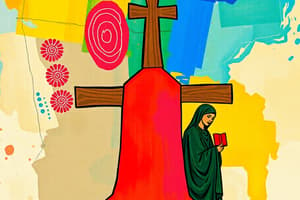Podcast
Questions and Answers
Which of the following is the BEST description of religion?
Which of the following is the BEST description of religion?
- A modern invention designed to control populations.
- A set of scientific principles for understanding the universe.
- A collection of cultural systems, belief systems, and worldviews relating humanity to spirituality. (correct)
- A purely personal philosophy with no impact on society.
Religious beliefs are uniform across all religions and sects.
Religious beliefs are uniform across all religions and sects.
False (B)
Name three major religions in the world.
Name three major religions in the world.
Christianity, Islam, and Hinduism
Religion significantly enriches art and philosophy, providing inspiration, depth, and moral frameworks that continue influencing contemporary culture and ______.
Religion significantly enriches art and philosophy, providing inspiration, depth, and moral frameworks that continue influencing contemporary culture and ______.
Match the following religions with a key aspect:
Match the following religions with a key aspect:
Which aspect of studying religions fosters respect and understanding of others' values and traditions?
Which aspect of studying religions fosters respect and understanding of others' values and traditions?
Religion has no impact on political systems.
Religion has no impact on political systems.
Give one example of how religion can influence culture.
Give one example of how religion can influence culture.
Which of the following is NOT a role of faith-based organizations?
Which of the following is NOT a role of faith-based organizations?
According to Weber, the protestant ethic is linked to higher economic growth compared to the Catholic ethic.
According to Weber, the protestant ethic is linked to higher economic growth compared to the Catholic ethic.
What term is used to describe individuals who convert to Christianity primarily for material benefits?
What term is used to describe individuals who convert to Christianity primarily for material benefits?
Faith-based organizations often provide ___ assistance to marginalized communities.
Faith-based organizations often provide ___ assistance to marginalized communities.
Match the following areas of service with their descriptions:
Match the following areas of service with their descriptions:
Which organization is cited as an example of faith-based economic development?
Which organization is cited as an example of faith-based economic development?
Christian organizations typically receive more funding from public donors than secular organizations.
Christian organizations typically receive more funding from public donors than secular organizations.
What is the main argument of Weber's theorem regarding religion?
What is the main argument of Weber's theorem regarding religion?
Organizations become similar when they depend on the same ___ and follow the same regulations.
Organizations become similar when they depend on the same ___ and follow the same regulations.
What role do faith-based organizations have in disaster response?
What role do faith-based organizations have in disaster response?
What role do religious institutions play in economic development?
What role do religious institutions play in economic development?
Understanding how religions have interacted over time has no impact on global history.
Understanding how religions have interacted over time has no impact on global history.
What is one benefit of interfaith dialogue?
What is one benefit of interfaith dialogue?
Many conflicts have ________ dimensions that can be understood to aid in resolution.
Many conflicts have ________ dimensions that can be understood to aid in resolution.
Match the following effects of religion on providers and recipients:
Match the following effects of religion on providers and recipients:
How can studying various beliefs encourage personal development?
How can studying various beliefs encourage personal development?
Religious teachings often emphasize the importance of charitable giving.
Religious teachings often emphasize the importance of charitable giving.
What is one role policymakers are interested in regarding religion?
What is one role policymakers are interested in regarding religion?
Religion intersects with ________, art, psychology, and other fields.
Religion intersects with ________, art, psychology, and other fields.
Which of the following is a concern regarding religion in development?
Which of the following is a concern regarding religion in development?
Religious beliefs can influence individuals' work ethic and economic behavior.
Religious beliefs can influence individuals' work ethic and economic behavior.
Name one contemporary issue influenced by religious perspectives.
Name one contemporary issue influenced by religious perspectives.
Constructive dialogue about beliefs can help reduce __________ among different groups.
Constructive dialogue about beliefs can help reduce __________ among different groups.
Match the following roles of religion with their descriptions:
Match the following roles of religion with their descriptions:
Flashcards
Religion
Religion
A collection of cultural systems and belief systems relating humanity to spirituality and morality.
Religious beliefs
Religious beliefs
Specific ideas and doctrines held by individuals within a religion that guide their morality and worldview.
Major religions
Major religions
The primary faiths across the world, including Christianity, Islam, Hinduism, Buddhism, and Judaism.
Cultural influences of religion
Cultural influences of religion
Signup and view all the flashcards
Religion's role in politics
Religion's role in politics
Signup and view all the flashcards
Impact of religion on art and philosophy
Impact of religion on art and philosophy
Signup and view all the flashcards
Cultural Understanding
Cultural Understanding
Signup and view all the flashcards
Historical Insight
Historical Insight
Signup and view all the flashcards
Interconnectedness in Religions
Interconnectedness in Religions
Signup and view all the flashcards
Ethical Frameworks
Ethical Frameworks
Signup and view all the flashcards
Conflict Resolution in Religion
Conflict Resolution in Religion
Signup and view all the flashcards
Self-Reflection
Self-Reflection
Signup and view all the flashcards
Global Citizenship
Global Citizenship
Signup and view all the flashcards
Interdisciplinary Connections
Interdisciplinary Connections
Signup and view all the flashcards
Encouragement of Dialogue
Encouragement of Dialogue
Signup and view all the flashcards
Economic Effects of Religion
Economic Effects of Religion
Signup and view all the flashcards
Providers in Religion
Providers in Religion
Signup and view all the flashcards
Recipients of Religious Aid
Recipients of Religious Aid
Signup and view all the flashcards
Work Ethic in Religion
Work Ethic in Religion
Signup and view all the flashcards
Social Capital in Religion
Social Capital in Religion
Signup and view all the flashcards
Religious Freedom
Religious Freedom
Signup and view all the flashcards
Policy Interest in Religion
Policy Interest in Religion
Signup and view all the flashcards
Collaboration with Religious Institutions
Collaboration with Religious Institutions
Signup and view all the flashcards
Faith-Based Organizations (FBOs)
Faith-Based Organizations (FBOs)
Signup and view all the flashcards
Social Services by FBOs
Social Services by FBOs
Signup and view all the flashcards
Education Initiatives by FBOs
Education Initiatives by FBOs
Signup and view all the flashcards
Healthcare FBOs
Healthcare FBOs
Signup and view all the flashcards
Weber's Theorem
Weber's Theorem
Signup and view all the flashcards
Protestant Ethic
Protestant Ethic
Signup and view all the flashcards
Differences in Budget Sources
Differences in Budget Sources
Signup and view all the flashcards
Institutional Theory
Institutional Theory
Signup and view all the flashcards
MEDA
MEDA
Signup and view all the flashcards
Community Building by FBOs
Community Building by FBOs
Signup and view all the flashcards
Study Notes
Religion and Religious Beliefs
- Religion encompasses cultural systems, belief systems, and worldviews relating humanity to spirituality, often including moral values.
- It comprises practices, rituals, and moral codes centered around the worship of deities, often incorporating ethical codes and community.
- Religions often include narratives, symbols, traditions, and sacred histories offering meaning to life and explaining its origin.
- Religious beliefs are specific ideas, doctrines, and teachings held as part of faith, shaping worldview, moral decisions, and providing purpose.
- Beliefs vary widely between and within religions.
Major Religions
- Christianity
- Islam
- Hinduism
- Buddhism
- Judaism
- Sikhism
- Bahá'í Faith
- Confucianism and Taoism
Impact of Religion on Society
- Cultural Influences: Religion shapes traditions, values, art, and social norms.
- Role in Politics and Law: Religion influences governance, legal systems, and public policy.
- Contributions to Arts and Philosophy: Religion inspires and informs cultural expressions and intellectual thought throughout history (e.g., visual arts, music, performing arts, literature, and poetry).
Importance of Studying Religions
- Cultural Understanding: Enhances diversity awareness, promotes cultural sensitivity and tolerance.
- Historical Insight: Religion significantly influenced historical events, politics, and social movements. Understanding interconnectedness provides global historical perspective.
- Ethical Frameworks: Religions offer ethical guidelines shaping individual behavior and societal norms, fostering philosophical exploration of existence, purpose, and morality.
- Conflict Resolution: Understanding religious dimensions of conflicts can aid in resolution and interfaith dialogue fosters peace.
- Personal Development: Studying various beliefs encourages self-reflection, exploration of personal values, and spiritual growth.
- Global Citizenship: Understanding of different religions translates to informed, engaged global citizenship and awareness of global issues.
- Interdisciplinary Connections: Studying religion connects to literature, art, psychology, and other fields, enriching social sciences disciplines (e.g., sociology, anthropology, and political science).
- Encouragement of Dialogue: Studying religions encourages open dialogue regarding beliefs. It reduces misconceptions and encourages nuanced views of different religions.
Religion and Development
- Religion is a complex and often sensitive factor in development. Traditional development frameworks often neglect its significance.
- Material and economic factors are prioritized in development, but spiritual and cultural dimensions are equally important.
- The volatility of religion may lead to religious crises if not properly managed.
- Religious institutions (providers) and individuals (recipients) are active in and influenced by economic outcomes.
Effect on Providers
- Employment through religious institutions.
- Income from donations, tithes, and offerings.
- Charitable giving based on religious teachings.
- Economic development initiatives within communities.
Effect on Recipients
- Employment within religious organizations.
- Access to social services (e.g., food banks, shelters, counseling).
- Social capital and networking opportunities.
- Influence of religious values on work ethics and economic decisions.
Policy Interest
- Policymakers study religion's influence on economic behavior.
- Interest in social cohesion and stability fostered by religion.
- Religious freedom and tolerance are key for development.
- Possible collaboration with religious institutions.
Faith-Based Organizations (FBOs)
- Involved in social services, education, healthcare, disaster relief, advocacy, community building, interfaith dialogue, youth, and family programs.
The Weber Theorem
- Weber argued that religion responds to the human needs for theodicy and soteriology.
- He notes the human struggle of reconciling a divine creator's power with the world's imperfections.
- Weber's "Protestant ethic and the spirit of capitalism" links Protestant values to economic development.
- Though debated, the correlation of Protestantism and higher economic growth remains a contentious issue.
Performance Differences between Christian and Secular Actors
- Limited data comparing Christian and secular actors' performance indicators.
- Christian development actors receive less public funding.
- They have more donors, volunteers, and lower management salaries compared to secular counterparts.
Institutional Theory and Actor Differences
- Institutional factors like shared donors, regulations, and networks can lead to similar organizational structures and behaviors.
Examples of Christian Involvement in Entrepreneurship and Finance
- Historical examples of Christian involvement in pawn shops, savings banks, and cooperative movements.
Studying That Suits You
Use AI to generate personalized quizzes and flashcards to suit your learning preferences.




